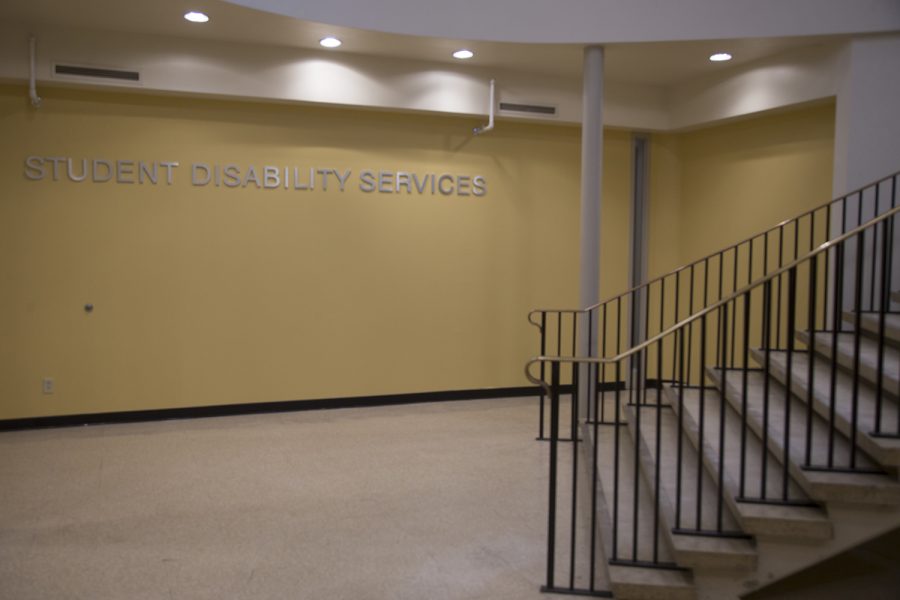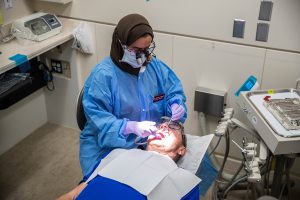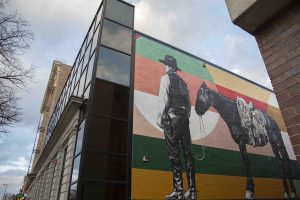Some UI students say snow, ice bring accessibility issues
Some UI students say a lack of snow and ice removal around crosswalks and bus stops can make getting around campus a major challenge.
The outside of the UI Student Disability Services office is seen on Wednesday, June 5, 2019. The office is located in the basement of Burge Residence Hall.
November 20, 2019
Slick sidewalks and snowfall can make for a miserable commute to campus for many University of Iowa students, but members of Students for Disability Advocacy and Awareness said ice can especially prevent an accessibility challenge for students with disabilities.
UI graduate student Andrea Courtney, Students for Disability Advocacy and Awareness treasurer, has a vision impairment that can make distinguishing patches of ice and snow on the ground difficult.
Courtney relies on the Cambus service to get to and from campus. She said she noticed that far areas on campus near where she lives on the Northside of Iowa City are not as well cleared as more heavily trafficked areas.
“I think there’s less removal in that vicinity since it’s not the main campus, necessarily,” Courtney said. “I’ve noticed a difference between the area that I tend to walk around to get campus versus the Pentacrest.”
UI senior Meaghan Schilia, a member of Students for Disability Advocacy and Awareness, said snow and ice on campus can cause difficulties when she’s getting to class. Schilia said she fell 16 times walking to and from class and at icy bus stops on campus last winter.
Schilia relies on Cambus and the Bionic Bus for transportation to and from class. Piled-up snow can prevent the wheelchair ramps on the buses from working properly, she added.
“When it froze over snow, they could not get the ramps down, so if I had my cart, or if I was having a bad day where I couldn’t get my knees up, they had to completely back up to an area where they could get the ramp out,” she said. “Or, they were chipping away at the snow or physically jumping on the ramp to get it down. It was completely ridiculous.”
Schilia said another accessibility issue she faces in winter is that many of the benches at bus stops are not cleared of snow and ice.
She was not made aware of opportunities to report snow and ice hazards on campus until another member of her organization informed her earlier this fall, Schilia said.
UI Students for Disability Advocacy and Awareness President Kaydee Ecker said there is no clear-cut way to report hazards. Ecker said the student group would ideally like to see an online system to report snow and ice on campus.
UI Student Government President Noel Mills said UI shared-governance leaders are aware of current issues with the reporting system.
RELATED: Students rally for disability awareness and inclusion on campus
“Snow and ice is of particular concern this time of year, and we’re in the stages of determining the best reporting mechanism,” she said in an email to The Daily Iowan. “Once we know the best way to report, we plan on informing students so they can be empowered to notify staff of issues.”
In an email to The Daily Iowan, UI Facilities Management Strategic Communications Director Wendy Moorehead said the group is currently working with campus partners to improve such reporting on campus.
“Accumulations of snow and ice are removed as expeditiously as practical in order to provide safe travel for pedestrians, including improving pathways for those with mobility issues and vehicular traffic during and after storms within the parameters dictated by weather conditions, available manpower, equipment resources and budget constraints,” she said. “We will return to areas later in the day to clean up snow/ice accumulations that could constitute a safety hazard for evening pedestrian/vehicle traffic.”
Moorehead added that most ADA-accessible ramps on campus are equipped with snow- and ice-melt systems.
UI Student Disability Services Director Mark Harris said he is not aware of any complaints from students about snow and ice-related issues specifically.
Harris said if students are unable to attend class for a disability-related reason, including weather impeding travel, accommodations are available.
“That most often comes into play if students have a mobility impairment — they may or not be wheelchair users,” he said. “That can be an accommodation that is a letter they take to their instructor in the event that weather prevents them from being in class or from being in class on time.”






